Intro
Learn about heartburn and pregnancy, including symptoms, causes, and relief methods, to manage acid reflux during prenatal care, ensuring a healthy pregnancy with natural remedies and lifestyle changes.
Heartburn is a common symptom experienced by many women during pregnancy. It is characterized by a burning sensation in the chest and throat, often accompanied by a sour taste in the mouth. This discomfort can be uncomfortable and disrupt daily activities, making it essential to understand its causes, symptoms, and treatment options. As pregnancy progresses, the risk of heartburn increases, affecting up to 50% of pregnant women. In this article, we will delve into the world of heartburn and pregnancy, exploring the reasons behind this phenomenon and providing valuable insights on how to manage it.
During pregnancy, the body undergoes significant changes, including hormonal fluctuations, weight gain, and shifts in digestion. These changes can lead to increased pressure on the stomach, causing the lower esophageal sphincter (LES) to relax and allow stomach acid to flow back up into the esophagus. This backflow of acid is what causes the characteristic burning sensation associated with heartburn. Additionally, the growing uterus can put pressure on the stomach, further exacerbating the condition. As the pregnancy advances, the likelihood of heartburn increases, making it a common complaint among expectant mothers.
The symptoms of heartburn during pregnancy can vary from woman to woman, but common complaints include a burning sensation in the chest, throat, and abdomen, as well as difficulty swallowing, coughing, and wheezing. Some women may also experience regurgitation of food, particularly at night, which can disrupt sleep patterns and affect overall well-being. It is essential to recognize these symptoms and seek medical attention if they persist or worsen over time. A healthcare provider can help diagnose the condition and provide guidance on managing symptoms and preventing complications.
Causes Of Heartburn During Pregnancy
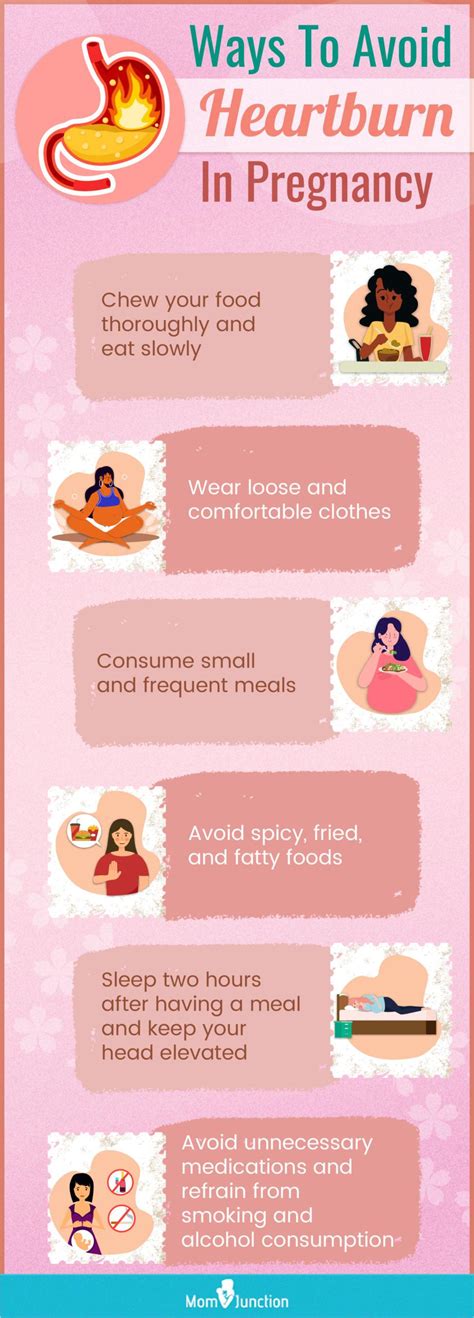
Heartburn during pregnancy is often caused by a combination of factors, including hormonal changes, weight gain, and digestive shifts. The hormone progesterone, which increases during pregnancy, can relax the muscles in the digestive tract, including the LES. This relaxation can lead to a decrease in the pressure that keeps the stomach acid from flowing back up into the esophagus. Additionally, the growing uterus can put pressure on the stomach, causing the stomach acid to flow back up into the esophagus. Other factors, such as eating spicy or fatty foods, drinking caffeine, and lying down after meals, can also contribute to heartburn during pregnancy.
Role Of Hormonal Changes
Hormonal changes play a significant role in the development of heartburn during pregnancy. The increase in progesterone levels can relax the muscles in the digestive tract, leading to a decrease in the pressure that keeps the stomach acid from flowing back up into the esophagus. This relaxation can also slow down digestion, allowing food to stay in the stomach for longer periods, which can increase the risk of heartburn. Furthermore, the hormonal changes can also affect the production of stomach acid, leading to an increase in acid production and a decrease in the production of digestive enzymes.Impact Of Weight Gain
Weight gain during pregnancy can also contribute to the development of heartburn. As the body gains weight, the pressure on the stomach increases, causing the stomach acid to flow back up into the esophagus. This pressure can also cause the LES to relax, allowing the stomach acid to flow back up into the esophagus. Additionally, weight gain can also lead to an increase in inflammation, which can further exacerbate the symptoms of heartburn.Symptoms Of Heartburn During Pregnancy
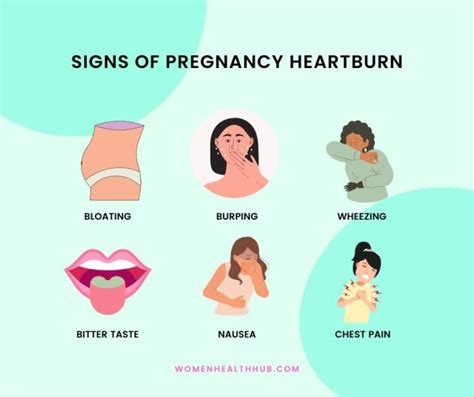
The symptoms of heartburn during pregnancy can vary from woman to woman, but common complaints include:
- A burning sensation in the chest, throat, and abdomen
- Difficulty swallowing
- Coughing and wheezing
- Regurgitation of food, particularly at night
- Discomfort or pain in the chest and throat
- Bloating and gas
These symptoms can be uncomfortable and disrupt daily activities, making it essential to seek medical attention if they persist or worsen over time. A healthcare provider can help diagnose the condition and provide guidance on managing symptoms and preventing complications.
Diagnosis And Treatment
Diagnosing heartburn during pregnancy typically involves a physical examination, medical history, and symptoms assessment. A healthcare provider may also recommend lifestyle changes, such as dietary modifications, to help manage symptoms. Treatment options may include: * Antacids to neutralize stomach acid * Histamine-2 (H2) blockers to reduce acid production * Proton pump inhibitors (PPIs) to reduce acid production * Lifestyle changes, such as avoiding trigger foods, eating smaller meals, and avoiding lying down after mealsIt is essential to work with a healthcare provider to develop a treatment plan that is safe and effective for both the mother and the baby.
Managing Heartburn During Pregnancy
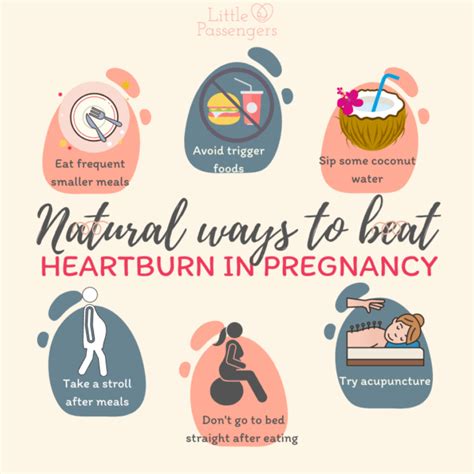
Managing heartburn during pregnancy requires a combination of lifestyle changes and medical treatment. Some tips for managing heartburn include:
- Eating smaller, more frequent meals to reduce pressure on the stomach
- Avoiding trigger foods, such as spicy or fatty foods
- Avoiding lying down after meals
- Raising the head of the bed by 6-8 inches to reduce reflux
- Avoiding tight clothing that can put pressure on the stomach
- Practicing relaxation techniques, such as deep breathing or meditation, to reduce stress
Additionally, a healthcare provider may recommend over-the-counter or prescription medications to help manage symptoms.
Lifestyle Changes
Lifestyle changes play a crucial role in managing heartburn during pregnancy. Some lifestyle changes that can help include: * Eating a balanced diet that is low in fat and sugar * Avoiding caffeine and carbonated drinks * Avoiding smoking and secondhand smoke * Getting regular exercise, such as walking or swimming * Practicing good sleep habits, such as avoiding heavy meals before bedtimeThese lifestyle changes can help reduce symptoms and prevent complications.
Preventing Heartburn During Pregnancy
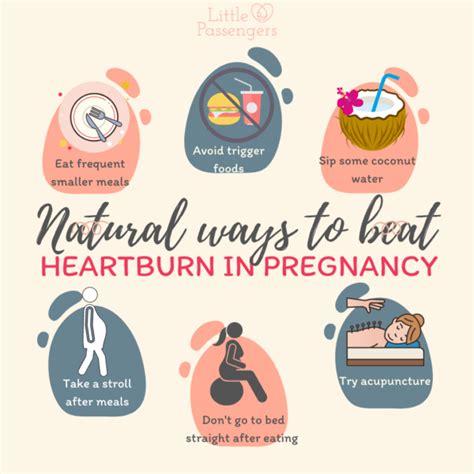
Preventing heartburn during pregnancy requires a combination of lifestyle changes and medical treatment. Some tips for preventing heartburn include:
- Eating a balanced diet that is low in fat and sugar
- Avoiding trigger foods, such as spicy or fatty foods
- Avoiding lying down after meals
- Raising the head of the bed by 6-8 inches to reduce reflux
- Avoiding tight clothing that can put pressure on the stomach
- Practicing relaxation techniques, such as deep breathing or meditation, to reduce stress
Additionally, a healthcare provider may recommend over-the-counter or prescription medications to help prevent symptoms.
Importance Of Prenatal Care
Prenatal care is essential for preventing and managing heartburn during pregnancy. Regular prenatal check-ups can help identify any potential issues and provide guidance on managing symptoms. A healthcare provider can also recommend lifestyle changes and medical treatment to help prevent and manage heartburn.Conclusion And Next Steps
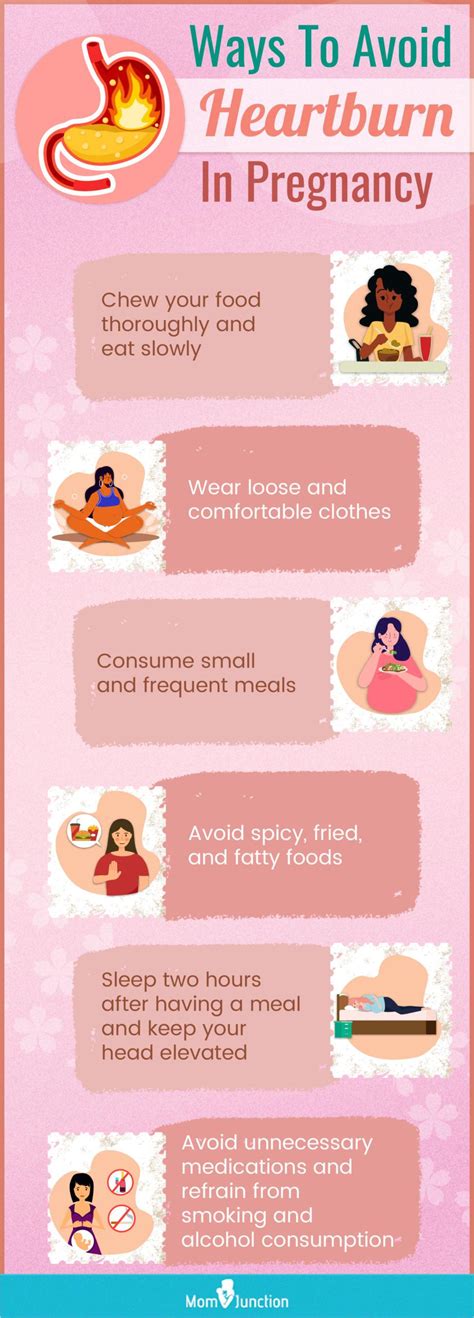
In conclusion, heartburn is a common symptom experienced by many women during pregnancy. Understanding the causes, symptoms, and treatment options is essential for managing the condition and preventing complications. By working with a healthcare provider and making lifestyle changes, women can reduce their risk of heartburn and improve their overall health and well-being. If you are experiencing symptoms of heartburn during pregnancy, it is essential to seek medical attention to develop a treatment plan that is safe and effective for both the mother and the baby.
We invite you to share your experiences and tips for managing heartburn during pregnancy in the comments below. Your insights can help other women who are going through similar experiences. Additionally, if you have any questions or concerns, please do not hesitate to reach out to us. We are here to provide you with the information and support you need to navigate this challenging time.
What are the common causes of heartburn during pregnancy?
+Heartburn during pregnancy is often caused by a combination of factors, including hormonal changes, weight gain, and digestive shifts. The hormone progesterone, which increases during pregnancy, can relax the muscles in the digestive tract, including the lower esophageal sphincter (LES). This relaxation can lead to a decrease in the pressure that keeps the stomach acid from flowing back up into the esophagus.
How can I manage heartburn during pregnancy?
+Managing heartburn during pregnancy requires a combination of lifestyle changes and medical treatment. Some tips for managing heartburn include eating smaller, more frequent meals, avoiding trigger foods, avoiding lying down after meals, and raising the head of the bed by 6-8 inches to reduce reflux. Additionally, a healthcare provider may recommend over-the-counter or prescription medications to help manage symptoms.
Can heartburn during pregnancy be prevented?
+Preventing heartburn during pregnancy requires a combination of lifestyle changes and medical treatment. Some tips for preventing heartburn include eating a balanced diet that is low in fat and sugar, avoiding trigger foods, avoiding lying down after meals, and raising the head of the bed by 6-8 inches to reduce reflux. Additionally, a healthcare provider may recommend over-the-counter or prescription medications to help prevent symptoms.
